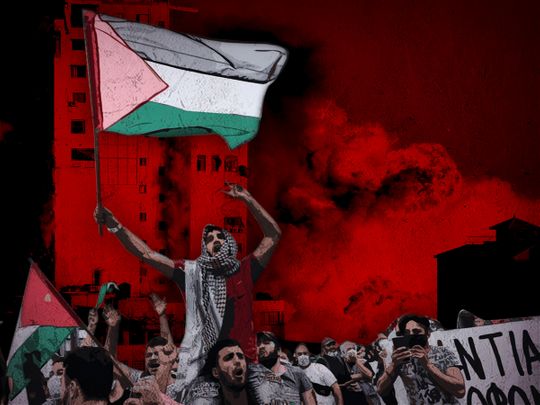
What do we talk about when we talk about Gaza? Its wars, whose costs have always been beyond all rational understanding? The infirm, rent body of its society, long whistled clean of hope?
Its people, whose dead last week seemed as if they were reaching out to the living to haul them into the void six feet under, where they would finally be assured of no more suffering?
Or do we talk about how latent in our sensibility — the sensibility of outliers comfortable in their homes in the Palestinian diaspora — lay a fearful guilt at having missed being there with one’s people at their rendezvous with hell last week?
As we contend for answers to our lofty questions, Gazans soldier on, in the aftermath of war, with their quotidian ones.
A ruinous toll in Gaza
Consider this. After a ceasefire was declared late Friday night, bringing to an end a devastating 11-day war, Gazans emerged from their homes, or the public shelters where they had sought refuge, to survey the unspeakable damage inflicted on their tormented, long-blockaded 140-square-mile strip of land by the Mediterranean Sea. The toll was, in both senses of the word, ruinous.
Yet as Gazans surveyed a scene that evoked imagery straight out of Picasso’s Guernica, you would’ve expected to see a people somberly enacting their private anguish on a public stage. But that was not the case.
Gazans, who, like other Palestinians, are imbued in the constitution of their worldview more with the teleological than the empirical spirit of history, knew instinctively how to heal the trauma of war — they took to the streets to celebrate.
What we saw on our television screens were crowds in a collective, joyous mood, waving flags and flashing victory signs, with some dancing in folk circles — a traditional hands-on-shoulders dance formation known as dabka, a free-for-all where anyone can join in on whim without the need for partners.
If you wondered, as many did, what on earth these Palestinians were celebrating anyhow, then you missed the point anthropologists, not to mention therapists, have made in their studies about how communal celebrations often act as a form of sublimation in the collective psyche of a people bruised by trauma.
But what Palestinians were doing in these celebrations last week, albeit unconsciously, was to share a moment of group ecstasy with fellow-Palestinians — all in the wake of a war where everyone had partaken of the suffering in equal measure and where now the stratified social fabric of the strip was made to melt away and reweave itself into an egalitarian whole.
To be sure, not just Gazans but Palestinians everywhere had ample reason to celebrate: The Gaza war had dramatically shifted perceptions of the Palestinian cause in the Western world. Never again would its seminal truths be seen as negotiable.
Growing sympathy for Palestinian cause
In the US, a big power complicit from day one in perpetuating the misery of the Palestinians, polling now suggests that growing sympathy for the Palestinian cause among Democratic lawmakers is matched by a similar shift in public opinion, which has come to see the call by Palestinians for justice as being organically linked the Black Lives Matter movement, which has grown over the last six years into a potent political force whose activists last week responded forcefully in support of Gazans during the war.
And on Capitol Hill, a faction of the Democratic Party, made up of high-profile progressives like Bernie Sanders and members of the Squad, have not been coy about how they expressed their support for Palestinian rights.
Equally not coy about expressing her views on the matter has been Detroit-born House Rep. Rashida Tlaib, the oldest of 14 children of Palestinian immigrant parents, and the first Palestinian American elected to serve in the US Congress.
Her views on the Palestine Question, including her call for a one-state solution, are now de rigueur in the mainstream media — so de rigueur, in fact, that after she stood face-to-face with the president of the United States on an airport tarmac last week and, for eight minutes, engaged him in an animated conversation about the Gaza war, The Washington Post titled the front-page news story, “After Biden talk, Tlaib’s viewpoint gains relevance”.
The reason the Palestinian cause — which has outlasted a full century of attempts to make it seem like a mere passing instant in history’s purpose — remains relevant today is because it has the-will-to-meaning encoded in its genes.
Other than saying, well, it’s better late than never that the US has recently stumbled upon that relevance, what else is there to say?
— Fawaz Turki is a journalist, academic and author based in Washington. He is the author of The Disinherited: Journal of a Palestinian Exile









